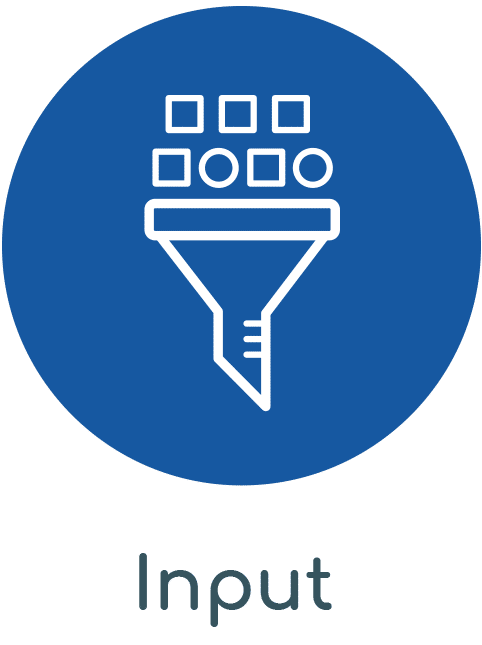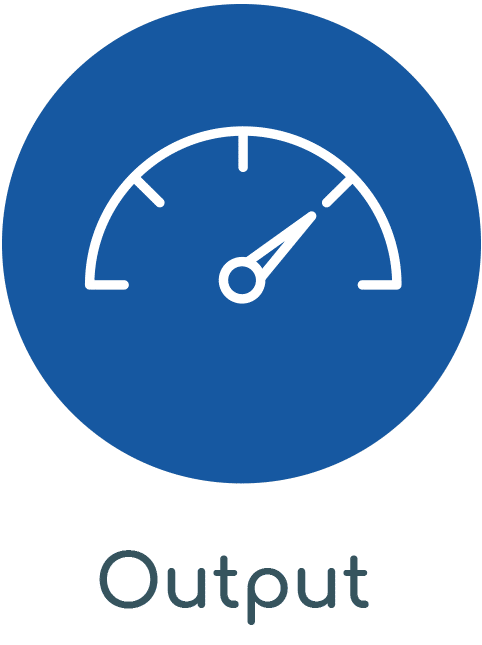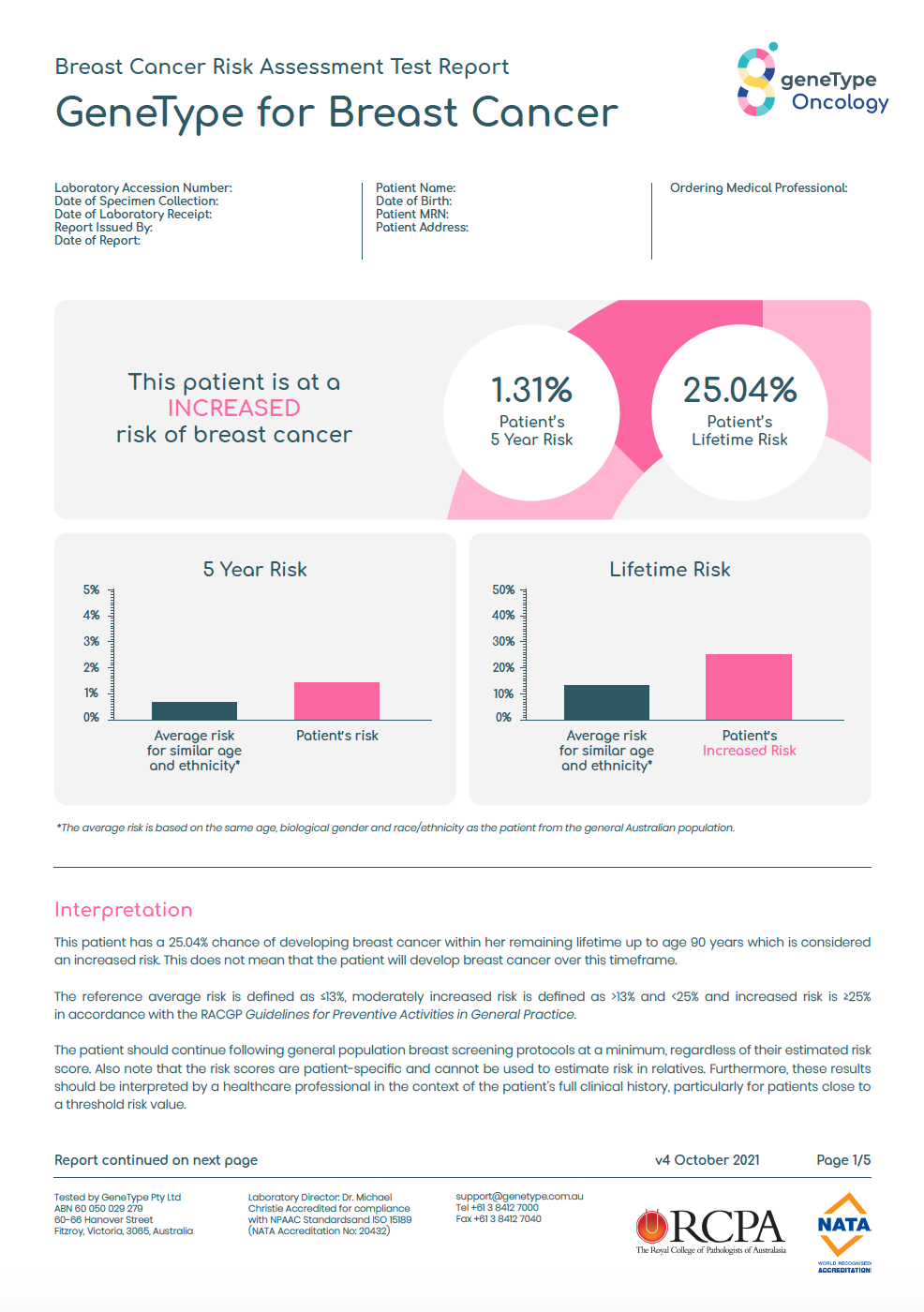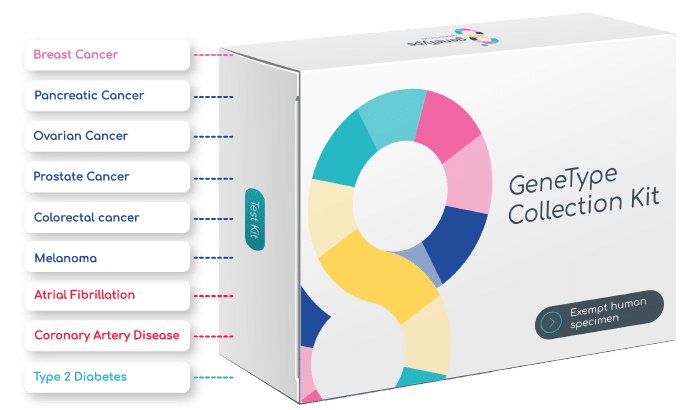Her breast cancer risk is more than her family history ¹ ²
GeneType for Breast Cancer integrates genetic factors with traditional risk markers to provide highly personalised – and actionable – risk predictions

Screening for BRCA1 and
BRCA2 may not be enough ¹ ²
While screening for BRCA1/2 can be an important first step for women¹ ²
- Most women don’t qualify for BRCA1/2 testing based on their family history status, and
- Most women who do qualify for testing will come back with negative results
Sporadic breast cancer is the most common form, meaning these women don’t have family history or hereditary pathogenic risk factors when diagnosed! ¹ ²

GeneType integrates personal clinical and genetic risk factors

Common genetic markers are combined to generate a polygenic risk score and this is combined with traditional clinical risk factors

Personalised risk scores including remaining lifetime risk and a 5-year risk

An integrated geneType risk assessment matters
~ 1 in 200 women are positive for a BRCA1/2 variant of breast cancer.⁴
For the remaining 199 women, with geneType, ~ 1 in 5 have a combination of risk factors that put them at an actionable, increased risk based on clinical* thresholds.
*5-year risk threshold of 1.67% or 3% and lifetime risk threshold of 20%5,6
Proactively identify and manage women with an increased risk of breast cancer
Know her risk. Manage her risk.
By knowing her personalised risk of breast cancer you can tailor your risk-reduction recommendations.
Risk reduction options include:
- Mammography (digital, tomosynthesis)
- MRI
- Ultrasound
- Breast cancer prevention specialist referral
- Medication (SERM/AI)
- Diet and exercise modifications
- Smoking cessation
- Alcohol consumption modification
AI, aromatase inhibitors; SERM, selective estrogen receptor modulator.

Identify your at-risk patients


The geneType patient
GeneType for Breast Cancer is appropriate for:
- Women
- Aged 30 years or older
GeneType is not appropriate for women with a personal history of breast cancer, or those who are positive for a pathogenic variant associated with hereditary breast cancer.
Integrating breast density

GeneType testing is simple

Step 1
Register as a provider; our team will provide clinical education and other resources as needed.
geneType will send kits to your clinic to have on hand.

Step 2
Discuss geneType with your patient.
Would geneType help them qualify for additional risk reduction strategies?

Step 3
Complete the Test Requisition form, collect a sample from the patient in the buccal swabs provided and return both to geneType.
You will have the option to use a paper requisition, or a secure, compliant portal to complete the ordering process.

Step 4
Leave the rest to us.
geneType will notify you when your patient’s results are ready.
You will have the option to request a consult with a genetic counsellor, whether to review your patient’s results and/or to follow-up with your patient, as needed.
One report with actionable insights
GeneType reports are structured to make the results easy to interpret and communicate to a patient.
The geneType for Breast Cancer report includes:
- snapshot of your patient’s 5-year and lifetime-risk scores
- interpretation of what their risk scores mean in the context of your local guidelines
- polygenic risk score accounting for the additional ~300 SNPs that may influence their breast cancer risk
- information about managing breast cancer risk factors
- and the type of screening and interventions that may be relevant to her risk category
The GeneType Management Guide describes how the results can help you apply your local guidelines and the types of screening measures or risk-reducing strategies that are recommended for each risk category.
Sample patient report

Do you have questions?
We have answers.
If we haven’t answered your question, contact us directly.
How does this fit in with the guidelines?
The guidelines recommend risk assessment for breast cancer. Women 35 and older are eligible for breast cancer risk reducing options based on their 5-year risk scores, as recommended by the USPSTF, NCCN and ASCO.5,6
To see if your patient is eligible, it is important to assess her risk.
If my patient already gets her regular mammogram, is there benefit to know her breast cancer risk score?
A holistic breast cancer risk score can be used to tailor a screening plan for your patient. This may involve screening than just mammogram alone. She also may be eligible for risk reducing medication or novel screening options.
If my patient does not have an elevated risk on the test, does that mean she can skip her mammogram screenings?
No!
GeneType for Breast Cancer results will indicate whether the patient is at increased or average risk.
If she is at average risk, it is still important to follow the recommended screening guidelines for women of her age.
Is this test reimbursed by insurance?
No. At this time geneType is a self-pay test. However, your patient may use FSA/HSA to pay for the test.
Are you ready to get started with geneType?
The first step is to trial geneType at your practice.

*Patient eligibility dependent on personal medical history, age and sex
Interested in ordering more than one disease? Order geneType Multi-Test.
See individual disease pages for more information about each test.
The Multi-Risk suite of tests is for adults 40-85 years of age. At maximum, a woman would be eligible for 8 diseases in the panel; a man would be eligible for 7. Starting at age 30, a patient may qualify for geneType's cancer risk assessments only.
Blog posts
Start the conversation about Breast Cancer risk
Under the fluorescent lights of a doctor’s office, it’s not always easy to know what questions to ask. Here are some breast cancer risk questions…
Proactive steps for breast cancer risk reduction
Breast awareness is important whether you are 35 or 75. When you understand your risk, you can be a better advocate for yourself…
GeneType: A new era for Genetic Technologies
Genetic Technologies changed a lot in the last year. Our product innovations, expansion into new therapy areas and acquisitions…
References
- van der Groep P et al. Cell Oncol (Dordr) 2011;34:71–88.
- Shiyanbola OO et al. Cancer Epidemiol Biomarkers Prev 2017;26:1753–60.
- Surveillance, Epidemiology, and End Results (SEER) Program SEER*Stat Database: Incidence – SEER Research Data, 9 Registries, Nov 2020 Sub (1975-2018) – Linked To County Attributes – Time Dependent (1990-2018) Income/Rurality, 1969- 2019 Counties, National Cancer Institute, DCCPS, Surveillance Research Program, released April 2021, based on the November 2020 submission.
- Maxwell KN et al. J Clin Oncol 2016;34:4183–5.
- Internal validation data.
- Allman R et al. PLoS One 2021;16(1):e0245375.
- Cancer Australia, 2018. Risk factors for breast cancer: A review of the evidence, Cancer Australia, Surry Hills, NSW.
Keep up-to-date with our latest advances
Sign up to our newsletter to stay informed about our latest advances and how these could support your practice.







